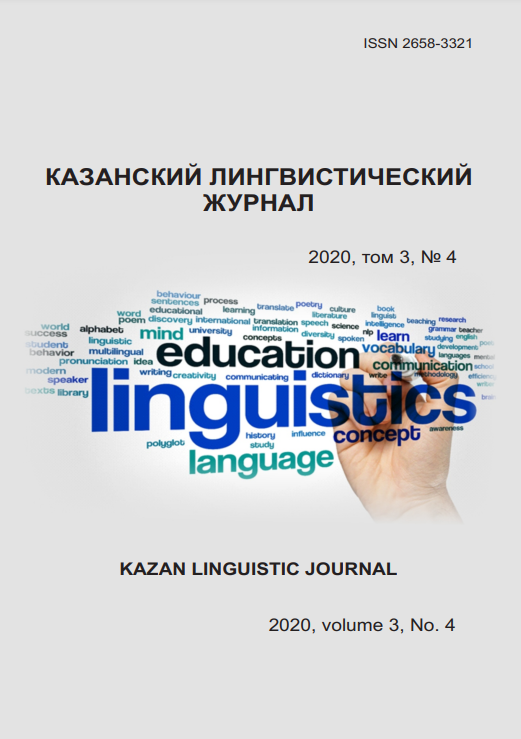Dialogicality as a categorical characteristic of romantic discourse
Keywords:
category of dialogicality, dialogue, romantic discourse, emotivity of the dialogueAbstract
This article is devoted to the study of the category of dialogicality and the related concept of dialogue in romantic discourse. The relevance of the topic is due to the continuing growth of interest in the category of dialogicality in various types of discourse, primarily those related to human relationships, as well as the significant research potential of romantic discourse. First, the author analyzes some theoretical approaches to understanding the category under consideration, and also provides its interpretation in modern scientific literature. The main attention is focused on dialogue as a form of active communicative interaction, resulting in the formation of a discourse. A significant part of the article is devoted to the study of the essence of dialogicity, its peculiarities and characteristic features of dialogues produced by participants in romantic interaction. An important result of the research is the discovery of a number of specific features of dialogicity, which are represented in its structure, addressee-addresser relations and the nature of relationships between interlocutors of interaction. Based on the analysis, it is also established that emotivity is a categorical characteristic of dialogicality in romantic discourse. It is proved that dialogic speech genres used by interactants are usually emotive, and individual replicas that express the feelings and emotions of romantic partners are of an emotionogenic character.
References
Литература
Барт Р. Фрагменты речи влюбленного. М.: Ad Marginem, 2002. 432 c.
Бахтин М. М. Проблемы поэтики Достоевского. Санкт-Петербург: Азбука, 2015. 412 с.
Бахтин М. М. Эстетика словесного творчества. 2-е изд. Москва: Искусство, 1986. 445 с.
Диалог: теоретические проблемы и методы исследования: Сб. научно-аналитических обзоров / Отв. ред. Н.А. Безменова. М., 1991. 159 с.
Кожина М.Н. Диалогичность как категориальный признак письменного научного текста // Очерки научного стиля русского литературного языка. XVIII-XX вв. Т. 2. Стилистика научного текста (общие параметры). Ч. 2. Категории научного текста: функционально-стилистический аспект. Пермь, 1998. С. 124–166.
Колокольцева Т.Н. Диалог и диалогичность в интернет-коммуникации. Волгоград: Известия ВГСПУ, 2011. С. 128–133.
Пульчинелли Орланди Э. К вопросу о методе и объекте анализа дискурса // Квадратура смысла: Французская школа анализа дискурса: Пер. с фр. / Общ. ред. и вступ. ст. П. Серио; предисл. Ю.С. Степанов. М.: ОАО ИГ «Прогресс», 2002. С. 197–224.
Ренц Т.Г. Романтическое общение в коммуникативно-семиотическом аспекте: монография. Волгоград: Изд-во ВолГУ, 2011. 392 с.
Шаховский В.И. Лингвистическая теория эмоций: монография. М.: Гнозис, 2008. 416 с.
Якобсон Р. Вопросы поэтики // Работы по поэтике. М.: Прогресс, 1987. 464 с.
Arnold F.H. Not My Will. Chicago: Moody Press. 1981. 334 p.
Goodman M. Last Chance. Richmond, Surrey: Mills & Boon. 1992. 340 p.
Petersen D. Tell Me Your Name. Richmond, Surrey: Mills & Boon Modern Romance. 1998. 196 p.
Sheldon S. Master of the Game. NY. Boston. Warner Brothers. 2001. 495 p.
White D. Between North and South. Thorndike Press. 2004. 196 p.
White M. Spring Song. Thorndike Press. 1998. 196 p.
References
Bart R. (2002). A Lover’s Discourse: Fragments. Moscow: Ad Marginem, 432 p. (In Russian)
Bakhtin M.M. (2015). Problems of Dostoevsky's Poetics. Sankt-Peterburg: Azbuka. 412 p. (In Russian)
Bakhtin M.M. (1986). The Aesthetics of Verbal Creativity. 2nd ed. Moscow, Iskusstvo. 445 p. (In Russian)
Dialogue: Theoretical Problems and Research Methods: Collection of scientific and analytical reviews. Executive editor N.A. Bezmenova. Moscow. 159 p. (In Russian)
Kozhina M.N. (1998). Dialogicality as a categorical feature of a written scientific text // Essays on the scientific style of the Russian literary language. XVIII XX centuries. Vol. 2. Stylistics of the scientific text (general parameters). Ch. 2. Categories of scientific text: functional and stylistic aspect. Perm Pp. 124–166. (In Russian)
Kolokol'tseva T.N. (2011). Dialogue and Dialogicality in the Internet Communication. Volgograd: Izvestiya VGSPU. Pp. 128–133. (In Russian)
Pul'chinelli Orlandi E. (2002). To the issue of the method and object of discourse analysis // Squaring Meaning: French School of Discourse Analysis: Transl. from Fr. / Common ed. and entered. Art. P. Series; foreword Yu.S. Stepanov. Moscow, OAO IG Progress. Pp. 197–224. (In Russian)
Rents T.G. (2011). Romantic communication in the communicative-semiotic aspect: monograph. Volgograd, Izd-vo VolGU. 392 p. (In Russian)
Shakhovskii V.I. (2008). Linguistic Theory of Emotions: monograph. M.: Gnozis. 416 p. (In Russian)
Yakobson R. (1987). Linguistics and Poetics. Raboty po poetike. M.: Progress. 464 p. (In Russian)
Arnold F.H. (1981). Not My Will. Chicago: Moody Press. 334 p. (In English)
Goodman M. (1992). Last Chance. Richmond, Surrey: Mills & Boon. 340 p. (In English)
Petersen D. (1998). Tell Me Your Name. Richmond, Surrey: Mills & Boon Modern Romance. 196 p. (In English)
Sheldon S. (2001). Master of the Game. NY. Boston. Warner Brothers. 495 p. (In English)
White D. (2004). Between North and South. Thorndike Press. 196 p. (In English)
White M. (1998). Spring Song. Thorndike Press. 196 p. (In English)






